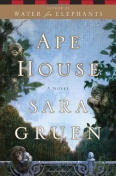BKMT READING GUIDES
Ape House
by Sara Gruen
Hardcover : 320 pages
1 club reading this now
0 members have read this book
Isabel Duncan, a scientist at the Great Ape Language ...
Introduction
Sam, Bonzi, Lola, Mbongo, Jelani, and Makena are no ordinary apes. These bonobos, like others of their species, are capable of reason and carrying on deep relationships - but unlike most bonobos, they also know American Sign Language.
Isabel Duncan, a scientist at the Great Ape Language Lab, doesn't understand people, but animals she gets - especially the bonobos. Isabel feels more comfortable in their world than she's ever felt among humans? until she meets John Thigpen, a very married reporter who braves the ever-present animal rights protesters outside the lab to see what's really going on inside.
When an explosion rocks the lab, severely injuring Isabel and "liberating" the apes, John's human interest piece turns into the story of a lifetime, one he'll risk his career and his marriage to follow. Then a reality TV show featuring the missing apes debuts under mysterious circumstances, and it immediately becomes the biggest - and unlikeliest - phenomenon in the history of modern media. Millions of fans are glued to their screens watching the apes order greasy take-out, have generous amounts of sex, and sign for Isabel to come get them. Now, to save her family of apes from this parody of human life, Isabel must connect with her own kind, including John, a green-haired vegan, and a retired porn star with her own agenda.
Ape House delivers great entertainment, but it also opens the animal world to us in ways few novels have done, securing Sara Gruen's place as a master storyteller who allows us to see ourselves as we never have before.
Sara Gruen on Ape House

Right before I went on tour for Water for Elephants, my mother sent me an email about a place in Des Moines, Iowa, that was studying language acquisition and cognition in great apes. I had been fascinated by human-ape discourse ever since I first heard about Koko the gorilla (which was longer ago than I care to admit) so I spent close to a day poking around the Great Ape Trust's Web site. I was doubly fascinated--not only with the work they?re doing, but also by the fact that there was an entire species of great ape I had never heard of. Although I had no idea what I was getting into, I was hooked.
During the course of my research for Ape House, I was fortunate enough to be invited to the Great Ape Trust--not that that didn?t take some doing. I was assigned masses of homework, including a trip to York University in Toronto for a crash course on linguistics. Even after I received the coveted invitation to the Trust, that didn?t necessarily mean I was going to get to meet the apes: that part was up to them. Like John, I tried to stack my odds by getting backpacks and filling them with everything I thought an ape might find fun or tasty--bouncy balls, fleece blankets, M&M's, xylophones, Mr. Potato Heads, etc.--and then emailed the scientists, asking them to please let the apes know I was bringing 'surprises.? At the end of my orientation with the humans, I asked, with some trepidation, whether the apes were going to let me come in. The response was that not only were they letting me come in, they were insisting.
The experience was astonishing--to this day I cannot think about it without getting goose bumps. You cannot have a two-way conversation with a great ape, or even just look one straight in the eye, close up, without coming away changed. I stayed until the end of the day, when I practically had to be dragged out, because I was having so much fun. I was told that the next day Panbanisha said to one of the scientists, ?Where's Sara? Build her nest. When's she coming back??
Most of the conversations between the bonobos and humans in Ape House are based on actual conversations with great apes, including Koko, Washoe, Booey, Kanzi, and Panbanisha. Many of the ape-based scenes in this book are also based on fact, although I have taken the fiction writer's liberty of fudging names, dates, and places.
One of the places I did not disguise or rename is the Lola ya Bonobo sanctuary in the Democratic Republic of the Congo. They take in orphaned infants, nurse them back to health, and when they?re ready, release them back into the jungle. This, combined with ongoing education of the local people, is one of the wild bonobos? best hopes for survival.
One day, I?m going to be brave enough to visit Lola ya Bonobo. In the meantime, in response to Panbanisha's question, I?m coming back soon. Very soon. I hope you have my nest ready!
(Photo © Lynne Harty Photography)
Discussion Questions
No discussion questions at this time.Book Club Recommendations
Recommended to book clubs by 0 of 0 members.
Book Club HQ to over 90,000+ book clubs and ready to welcome yours.
Get free weekly updates on top club picks, book giveaways, author events and more








